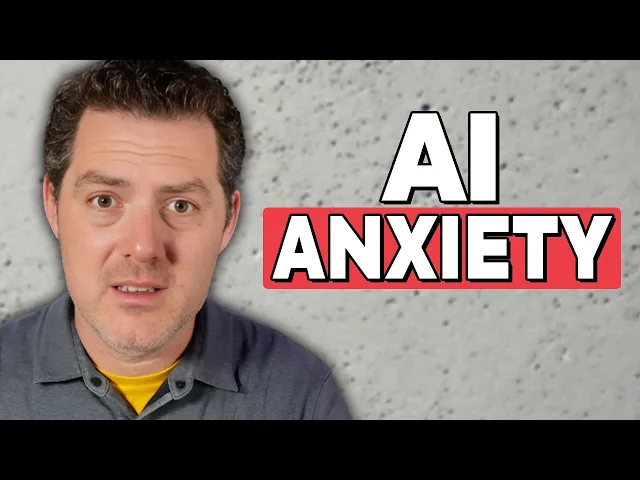AI Doomers are WRONG about job destruction! Here’s Why…

AI won't steal your job after all
The fear of AI taking over our jobs has become the digital boogeyman of the 2020s. Headlines warn of mass unemployment while tech visionaries paint pictures of a workless future. But what if this narrative is fundamentally flawed? In a refreshing counter to today's AI panic, recent analysis suggests that artificial intelligence might enhance rather than eliminate human work.
What the evidence actually shows about AI and employment
-
Historical perspective matters: Similar fears emerged during previous technological revolutions, yet employment has consistently grown despite automation. The industrial revolution, computing age, and internet era all transformed work without causing permanent unemployment surges.
-
AI is more complementary than competitive: Rather than replacing humans entirely, AI tends to augment human capabilities by handling repetitive tasks while creating new roles requiring human judgment, creativity, and interpersonal skills. The technology follows a pattern of task redistribution rather than wholesale job elimination.
-
Economic adaptability is underrated: While specific jobs may disappear, economies consistently demonstrate remarkable resilience in creating new types of work. This adaptation happens through market mechanisms, educational shifts, and human innovation that doomsday predictions consistently fail to account for.
-
Productivity benefits typically outweigh displacement costs: When implemented thoughtfully, AI-driven productivity gains can expand economic opportunities, potentially creating more jobs than are lost and generating prosperity that funds new ventures and services.
The complementarity principle changes everything
The most compelling insight from this analysis is the principle of AI-human complementarity. Rather than viewing automation and human labor as an either/or proposition, the evidence suggests a powerful both/and relationship. AI excels at processing vast datasets, identifying patterns, and executing routine tasks with precision. Humans remain unmatched in contextual understanding, ethical judgment, creative thinking, and empathetic connection.
This complementarity matters tremendously because it reframes how businesses should approach AI implementation. Instead of asking "what jobs can we replace?", forward-thinking organizations are asking "how can we use AI to make our people more effective?" This shift in thinking creates fundamentally different outcomes—enhanced human potential rather than human replacement.
Consider healthcare: AI diagnostic tools don't replace doctors; they provide decision support that allows physicians to make better diagnoses while spending more time on patient interaction. Similarly, in legal work, AI contract analysis doesn't
Recent Videos
How To Earn MONEY With Images (No Bullsh*t)
Smart earnings from your image collection In today's digital economy, passive income streams have become increasingly accessible to creators with various skill sets. A recent YouTube video cuts through the hype to explore legitimate ways photographers, designers, and even casual smartphone users can monetize their image collections. The strategies outlined don't rely on unrealistic promises or complicated schemes—instead, they focus on established marketplaces with proven revenue potential for image creators. Key Points Stock photography platforms like Shutterstock, Adobe Stock, and Getty Images remain viable income sources when you understand their specific requirements and optimize your submissions accordingly. Specialized marketplaces focusing...
Oct 3, 2025New SHAPE SHIFTING AI Robot Is Freaking People Out
Liquid robots will change everything In the quiet labs of Carnegie Mellon University, scientists have created something that feels plucked from science fiction—a magnetic slime robot that can transform between liquid and solid states, slipping through tight spaces before reassembling on the other side. This technology, showcased in a recent YouTube video, represents a significant leap beyond traditional robotics into a realm where machines mimic not just animal movements, but their fundamental physical properties. While the internet might be buzzing with dystopian concerns about "shape-shifting terminators," the reality offers far more promising applications that could revolutionize medicine, rescue operations, and...
Oct 3, 2025How To Do Homeless AI Tiktok Trend (Tiktok Homeless AI Tutorial)
AI homeless trend raises ethical concerns In an era where social media trends evolve faster than we can comprehend them, TikTok's "homeless AI" trend has sparked both creative engagement and serious ethical questions. The trend, which involves using AI to transform ordinary photos into images depicting homelessness, has rapidly gained traction across the platform, with creators eagerly jumping on board to showcase their digital transformations. While the technical process is relatively straightforward, the implications of digitally "becoming homeless" for entertainment deserve careful consideration. The video tutorial provides a step-by-step guide on creating these AI-generated images, explaining how users can transform...
